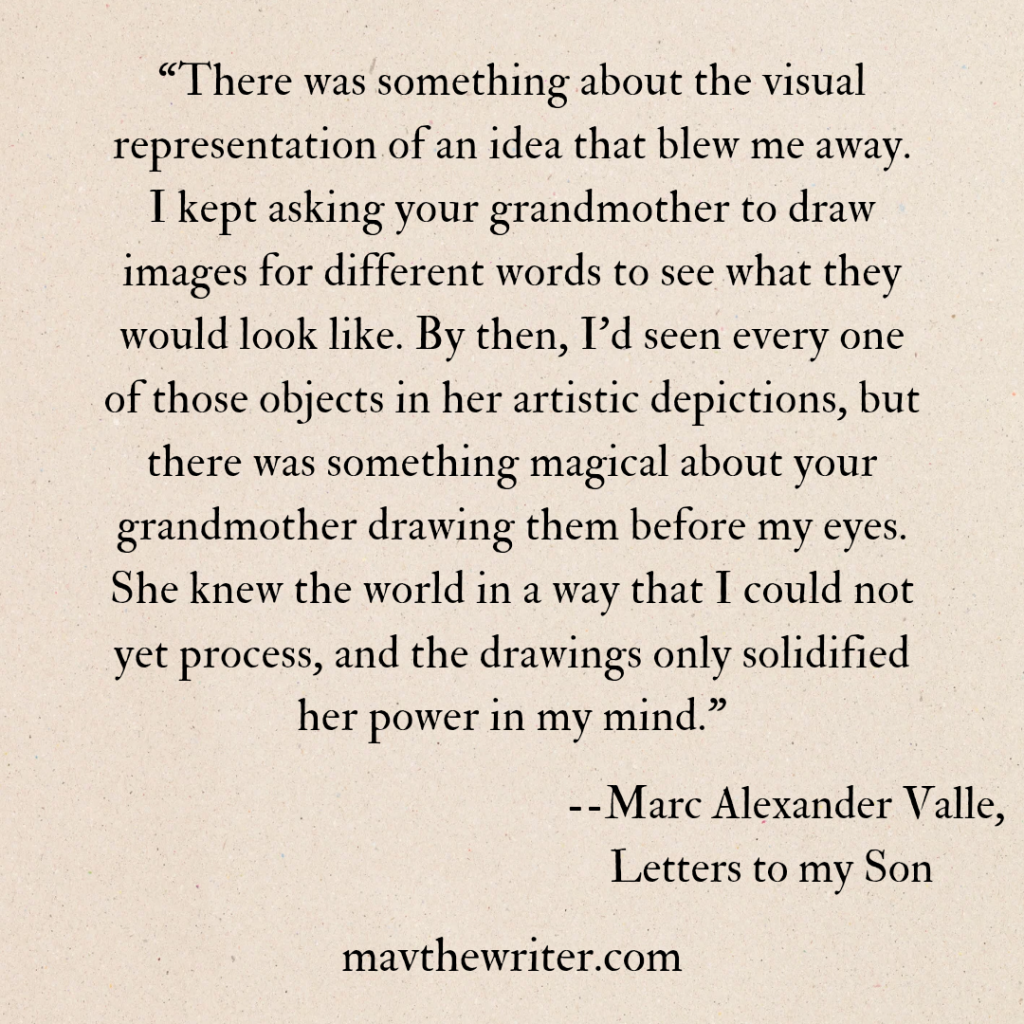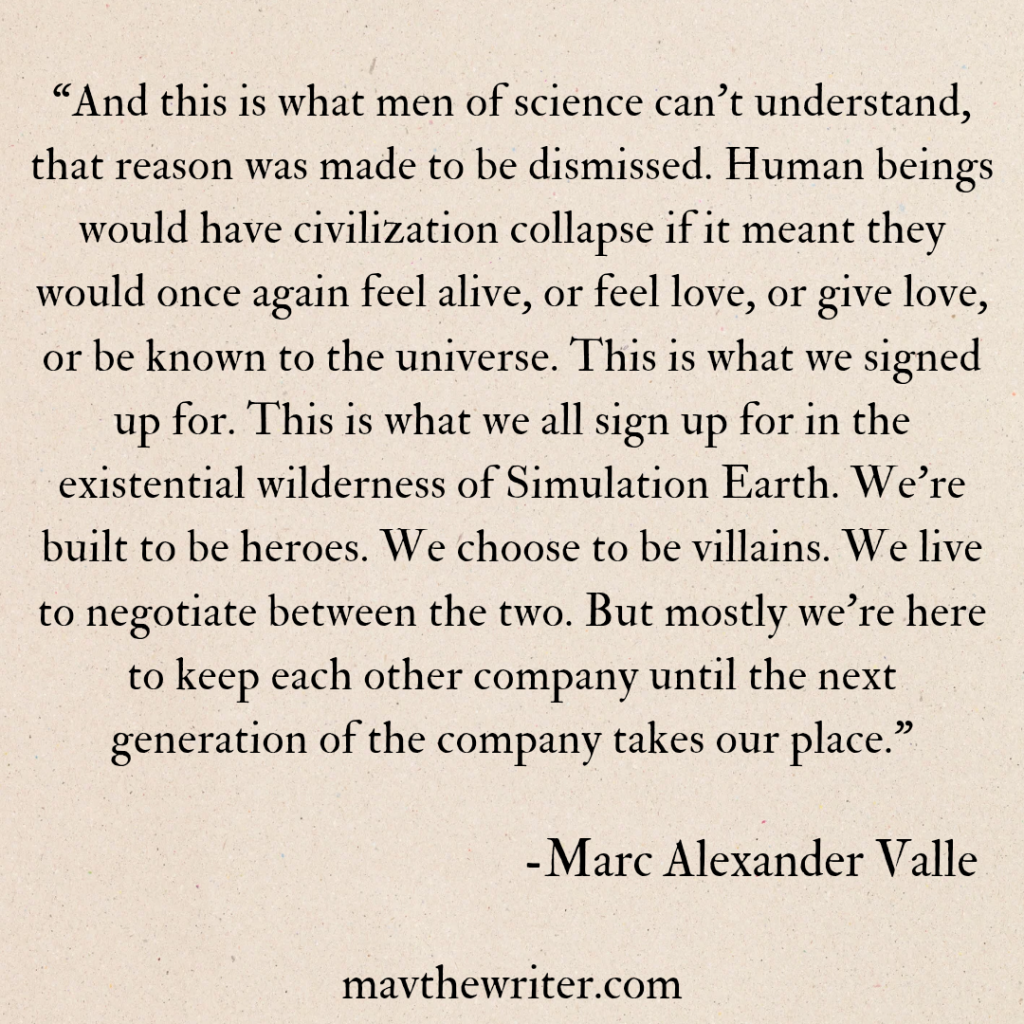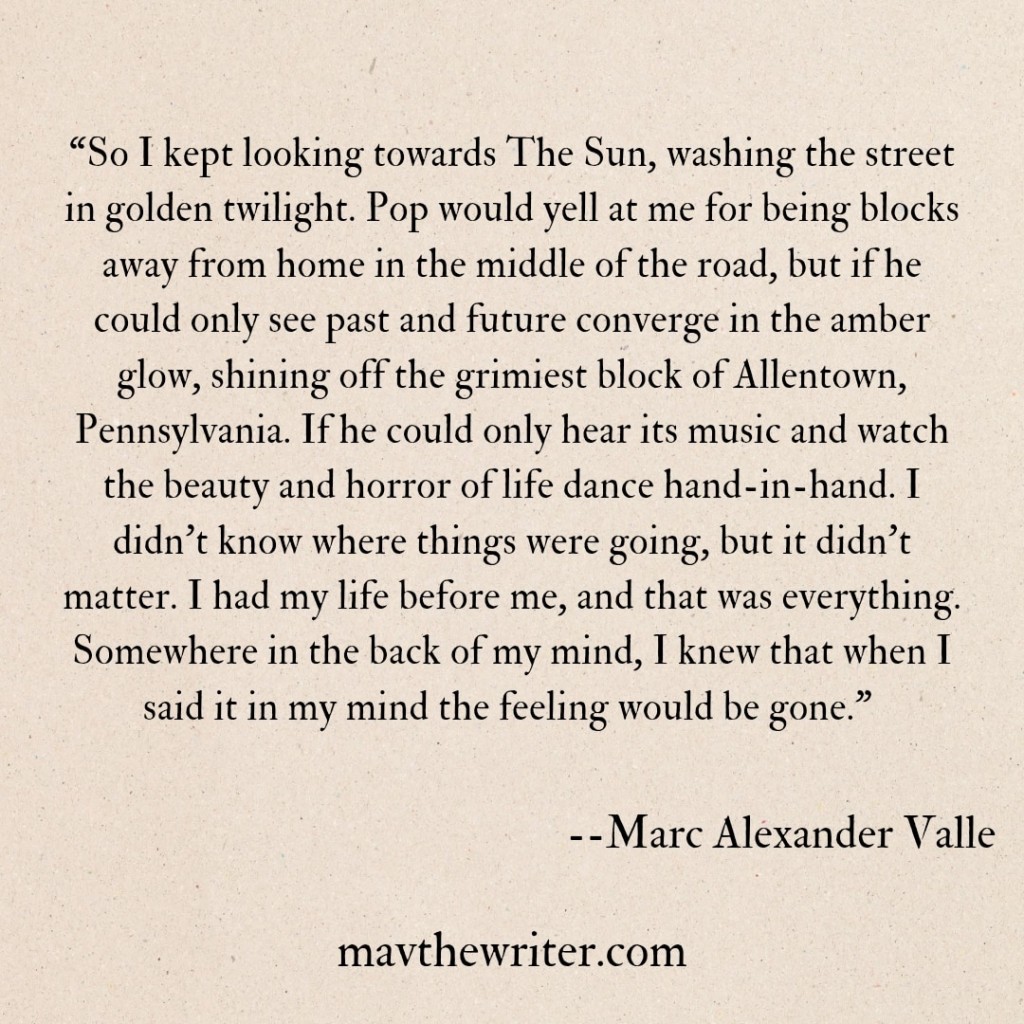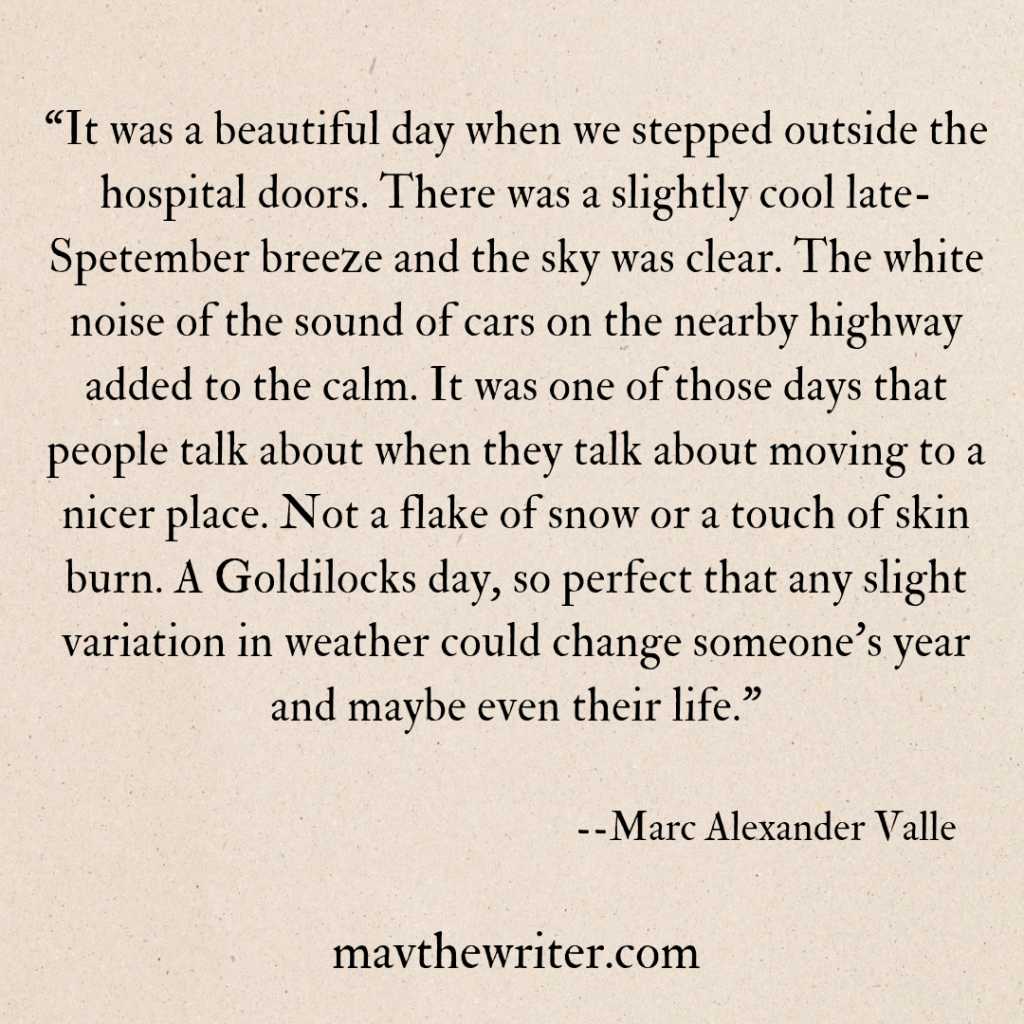
by
mavthewriter
Categories: WritingTags: #amwriter, #amwriting, #amwritingpoetry, #childhoodmemories, #writers, #writerscommunity, author, Childhood, memoir, Writing, writingcommunity
Leave a comment





It’s been a week since your second birthday, and I still have yet to write my birthday letter to you. Things are just as hectic as everyone said they would be. Some days I accept it. Some days I rage against it like King Lear and the thunderstorm. But every day I’m grateful for what you and your siblings have taught me about what’s important. I was so set on this idea of “making it” and “getting noticed” that I forgot why I started to write to begin with. I wrote and created art to feel normal and well inside. It became my medication, protecting me from a mediocre world with mediocre ideas and even more shallow emotions.
Now there is no time to let those demons have their way. I have to make the time to write when I can find the time and when I’m bold enough to take artistic risks. Hollywood, the publishing world, and any industry under the sun wouldn’t have known what to make of me anyway. Not to mention, stardom sounds about as interesting as cyanide these days.
For the first time, I fear death more than anything. It might not be saying much to the average person, but it’s a revolutionary idea to me. For the first time, I don’t need the Shangri-la promise of celebrity-induced admiration to get me through my days. I only need the admiration of the people under one roof. My roof. And that roof is bigger than the world, and big enough to fill my love for you, and my love for everyone in it. But today I reaffirm my love for you, Emile. Because you are 2-years-old today. And you will be 2-years-old forever in my heart, a heart once filled with the wrong things. False things. With bad feelings and dumb ideas. The struggle is real and the struggle is to be as honest and good as possible in every corner of your life. The struggle is the embodiment of suffering, but it’s the only struggle that counts.
I don’t claim to have won that battle, but I know that I am winning. And I can give you no birthday gift to compensate for that.
I love you, Emile. How did I ever make it without you and your siblings? God only knows.
Happy birthday.
I had a roommate in college that couldn’t get used to it. Frank would walk in and say, “How come you’re always just looking at the wall when I come in?” I wanted to tell him that I was actually staring at the corner between the ceiling and the wall, but I knew it wouldn’t matter. I was socially inept back then, but I wasn’t that helpless.
But I would just lay there and think, feeling an immense sense of sadness about my life. I wanted to get away from who I was without losing my heart, my mind, and my beliefs. Daydreaming provided a drug-free buffer from a world that didn’t get me but still couldn’t get rid of me.
It really seemed to bother Frank though. It was the way he’d say it. Not with malice, but not jokingly either. Like he’d caught someone smelling their own underwear. In time, whenever I heard him approaching the door, I’d sit up and find something to do in order to look occupied. It was like working a minimum-wage job and hearing the boss’s keys jangling around the corner.
I still do it today when I hear Yvonne walking upstairs yet she’s one of the few people who’s ever understood me. It’s another little complex of mine that I’ve picked up like a common cold, and I don’t see it leaving my body anytime soon.
It takes love and it takes guts to undo what’s been done by an idiot. But we only have less than a lifetime to undo it. And there’s no shortage of idiots.
One of my earliest memories of your grandmother is learning how to spell words. She would draw a picture and write the word beneath it. I asked her multiple times to run this lesson for me, and every time she did do it for me, she’d place a cup of juice with Vienna Fingers on the kitchen table by my side.
There was something about a visual representation of an idea that blew my mind. I’d ask her to draw different words to see what they look like. By then, I’d seen every one of those objects in artistic depictions, but there was something magical about your grandmother doing it before my eyes. She knew the world in a way that I couldn’t yet process, and the drawings solidified her power in my mind.
Sometimes I swear I can feel abstract ideas as tangibly as I can feel the keys on this computer. I can perceive their texture and their weight. Sometimes I can see the cost of manifesting them into the world, and sometimes I can see their consequences. This phenomenon has fueled my art and maybe my humanity.
I’m sure there’s an earlier memory of your grandmother somewhere in my unconscious. I’ll keep it there until it needs to be replaced, and I’ll keep the memory from you until something more pressing needs to be said. I’ve learned that it’s better to see loved ones at their greatest moment if you can help it. For everything else, there’s Vienna Fingers and juice.
by Marc Alexander Valle
I let him hit me. Not punch me and not “I let him” as in “Sure! Go ahead and hit me” but I let him hit me. He’d push my head with an open hand. I told him to stop, but he didn’t. He’d hit me more than I’d like to admit, and sometimes I even told myself we were really friends.
Some time ago, I started to believe that it began in Algebra class, and that I was Tourette’s-and-facial-tic-free until I sat in front of Axel Sidezski that sophomore year of high school. I don’t remember having or feeling the tics before then, and for years I felt shame for knowing that I let him do that. It took many more years to begin to understand why I did.
I googled searched Axel the other day, asking two questions: Is he still the same? And is he doing better than I am? I searched for 10 minutes, and I only found white-page profiles of other Axels. Nowhere could I find that parted, reddish-blondish hair. Nowhere could I find that smirk.
I made a promise to myself long ago. I told myself that I would write things and create things of immense beauty. I told myself that if the Axels of the world ever came back, I could do one thing better than they could, one thing no person can take away.
Is he still the same and is he doing better than I am?
I don’t even think he’d remember my name.
When something doesn’t go Emile’s way, he says that it’s stuck. When he can’t open a door, it’s stuck. When a ball or toy is lodged under something, it’s stuck. When he can’t push his carriage across the sidewalk, it’s stuck. When an object is too heavy to lift and throw outside of his playpen, it’s stuck. Stuck no longer means stuck to him. Anything that serves as a source of frustration and forces him to solve a problem, anything that he can’t control and must learn to overcome, anything that he can’t manipulate and must learn to leave alone, all of it is stuck. With that said, I have a possible name for my future book of stories and essays that I’m writing for Emile. The World Is Stuck.
Devin Maguire Can Bite My Dust
by Marc Alexander Valle
10-year old Devin Maguire held onto his BMX handlebars and stared at my new bike. “Your dad got that bike from a thrift store.”
“No, he didn’t!” I said.
“Yes, he did. I can tell.”
“No, he didn’t.”
“Yeah, cause there’s marks on it.”
I looked down at the bike. There were scuff marks on the handlebars, but that was it.
“He got it from K-Mart,” I said.
“Okay, which one?”
“The one down the street.”
“I know all the bikes at K-Mart. I didn’t see that one there.”
I shrugged my shoulders. “Well, that’s where he got it from.”
“Did he tell you he got it from there?”
“No.”
“Then how do you know?”
Devin stared right into my eyes. He had a blank expression, but I swore I could see a smirk. It was the same smirk he always had, the same one he had whenever he beat a kid in a race.
“So?” Devin said. “How do you know?”
Devin kept staring. He looked as though he had all the time in the world and the absolute certainty that he was right. I knew that I had only a beat or two before I looked like a fool. I had to answer.
“Cuz,” I said, “My parents don’t shop at thrift stores!”
Devin continued to look into my eyes. I felt like he was searching for something, and I needed to keep my composure. Didn’t he see my brother with a new bike last year? Didn’t he know it was my turn?
I tightened my lips and gripped my handlebars. Devin scrunched his eyebrows. I quickly glanced down at his bike.
“Alright,” he said, letting out a snicker. Then he rode off towards his apartment building.
When my dad came back from work, he told me that he bought the bike from a thrift store. The same store we’d been to several times that year. ©2022
Nearly a century and a half of music recordings and centuries more of musical compositions are at your disposal. Use it. Find it. Let it talk to you. It can help you at any time. Never expect it to solve the problem, but music can expose the underlying issues of your life that make the problem seem real.
I was sad in my early 20s. Very sad. Everything was tragic, and everything I tried to do seemed to end in failure. I felt as though I couldn’t even get a hello from people and from the world. I wanted it all to end sometimes. Music was that hello.
It talked to me directly, and it made me believe that there are and have been others just like me. They think like me, and they feel like me. Music was the code between us, and the message was, “I am an artist.” Music told me that my role was to reevaluate norms. I was never to be satisfied with what we assumed to be true, but I was never to change my core beliefs. There was nothing wrong with me. I was normal. It was the conversation between the individual and the world that was distorted.
There’s a link between youth and music and the way it shapes our views. How will you allow it to shape yours?
I never wanted to be a writer first. I wanted to be Steven Spielberg. At age 8, I asked the school librarian if she had a book on Spielberg.
She said, “No, but he’s a very interesting person. I think I’ll look for one and order it.”
I kept going back to the librarian nearly every day to see if she found the book and she eventually ordered it.
“It’ll take two weeks to get here,” she said. Once again, I went to the library every day and asked to see if the book arrived. I thought that maybe asking for it would speed up the process and ever time she told me that it takes two weeks to get to the school.
So as I waited, I tried to imagine what the book would look like and what it would say about Spielberg. I wanted to know about every movie that he made and what it would take to be a movie director. All I knew was that this was the man behind all of my daydream fantasies, and he got paid big houses and cars to make them. Movies allowed me to explore a more courageous side of myself that was not manifested in my interpersonal social life. I could be anyone I wanted after the credits started to roll, and I believed that I had a few characters of my own to share.
When the book arrived it was thinner than I thought, but I opened it and took in the new book smell. I could hear the glue of the bindings and the hard cover crackle. The pictures were in color, and I sat down to take them in.
I can’t remember exactly what was said about him in the book. Over the years I would take in more information about him and all the information seems to conflate to that book. But I do remember that this was the first time that I read a book that was purely informational. Until this day, I’m good at absorbing trivial information and consider myself an info junkie. I have so much data in my head that it fuels my imagination and serves as points of references in my mind. This book started it all.
The book didn’t help me become a filmmaker, but it helped me see the world more critically as non-fiction has allowed me to do. It helped me become a better writer and artist, who work deals with the critical analysis of reality and its nature.
“Mr. XYZ?!” Mrs. Cart hollered in front of the seventh grade class, “You want to write about Mr. XYZ?! This is supposed to be a paper about heroes. Do you even know who Mr. XYZ is?!”
. . .
The plan was to write a term paper that made me look cool. I chose an unsavory character from history. One who I’ve referred to as Mr. XYZ. Mrs. Cart didn’t follow the plan.
Back home, I paged through the Encyclopedia Britannica, looking to please her.
George Washington. Boring.
Thomas Jefferson. Boring
Abraham Lincoln. Boring.
Axel Rose. Taken.
John F. Kennedy.
The theme music for the film JFK blared inside my twelve year-old head. Three months earlier, Oliver Stones’ film suggested my first non-fiction idol. I wanted to be him as much as Luke Skywalker. I now had details in my hands to support those feelings.
I wrote the paper on JFK.
I turned it in.
Mrs. Cart read it in front of the class, said something about my turning things around.
I had written every word to get back into her graces and it worked.
I had found an acceptable hero. One that I fantasized about being.
I crafted a narrative. I was adored for it.
. . .
I had sold out, compromised.
But remained true. At least to what I wanted to believe was true.
My journey as a writer began.
The image above is copyrighted ©2016 by Marc Alexander Valle
I finished four screenplays as a teenager while my grades suffered. The first was called Land of the Lost River. It was a Spielberg-inspired story. It involved heroes fighting Nazis and dinosaurs, looking for the fountain of youth and messiah-like aliens saving the day in the end.
Then there was An Unserialed Surreal Christmas Carol. It took place in a small mid-west city. The main character, who attempted to move to Hollywood to make movies, got stuck in this city on his way there. No need to get into detail. Nearly all other elements resembled Pulp Fiction and Reservoir Dogs.
Worn to Perfection was a script that I wrote for Paul Newman and Robert Redford. It was about two aging con-artists bonding together for one last heist.
Finally, there was Abduction. It was about a teenager who abducts the man that he believes molested him.
This is what I see now:
Land of the Lost River was about being saved from myself.
An Unserialed Surreal Christmas Carol was about being lost
Worn to Perfection was actually about the pain of absent grandparents. Elderly relatives that would have put my household’s anxiety in balance had they been present.
Abduction was about anxiety, depression, mental illness and my desire to be diagnosed with one. Because if you were as strange as I believed people saw me, and if you were alienated as I felt, than you’d want a mental illness to explain it too.
But like many teens did with their comic books and baseball cards, I threw out all of those pre-graduation drafts. The only thing I bothered to continue to work on for years was Abduction.
I cringe at the thought of reading a draft of that. And hope that I always will.
“Everything is small,” I said to Mrs. Reed, my second grade teacher.
“What do you mean, hun?” she said.
“Like everything I see is small.”
“What do you mean by small, sweetheart?”
“Like. . .I don’t know…small.”
“Well, does your head hurt?”
“No.”
“Are you dizzy?”
“No.”
“Is your belly achy?”
“No.”
“Do you have to do a number 2?”
“No.”
“Then I can’t send you to the nurse, hun. Sit down.”
The entire world looked like a miniature model. Whenever I experienced this state of consciousness, I told myself, “I’m really here. I’m really here. I’m really here. I’m really here. . .”Supposedly, the name of this neurological condition is called Alice-in-Wonderland syndrome, or Lilliputian hallucinations. The condition is marked by the feeling that the physical environment around the individual has shrunk. It’s usually experienced in childhood and passes in time as was the case for me.
Scientist are now starting to express the theory that reality is a hologram and that we are not really here. Try telling that to Mrs. Reed. She’ll send you to get a drink of water and sit you out for recess.
Sequel to sci-fi film. Crowded audience. The movie previews play. One after the other, it’s a preview for an animated kids film.
The animated animals do silly things. Make silly jokes. A man, three seats down, laughs. He laughs with his mouth wide open. I don’t find any of this funny. They’re jokes for kids, but somehow it tickles his belly. He sounds like Santa Claus ho-ho-ho-ing at a bar with friends. The lady he’s with laughs too. She’s not as loud, but she sounds like she’s enjoying herself just as much as he is. I’m disgusted. Is this all it takes for some people?
After several animated film previews, a preview for a superhero film comes on. I’m not a fan of these recent superhero films. They’re candy for tweens and fanboys. But I’m enjoying the preview for this one. It involves the government and the superheroes.
This can be good. Very philosophical. Risky even. I want to see it.
“I don’t get it,” the guy says.
“I don’t get it either,” she says.
Is this it? Is this the top of pops when it comes to being a successful artist? Entertaining this guy and his wife? Could I even have a conversation with them about anything other than football scores? I will not write for these people.
. . .
It’s not about writing for yourself. It’s about writing from yourself. It’s not about being perfect. It’s about perfectly expressing who you are.
I still entertain thoughts of being widely accepted by the public. But the style of my artistic output says that it won’t happen.
It’s hard to accept, but liberating in those moments when you do accept it.
Why is it hard to accept?
We have no right to see ourselves the way we want to. It violates who we actually are. And who we are is not always beautiful. It’s rough, it’s twisted, it’s a weirdo. But if we can express those things than we can create beauty.
. . .
The movie ended. It liked it. I went home. I sat down to write.
Nothing came out.
Meditation has taught me to forgive myself. When you have your eyes closed and you’re trying to concentrate on breathing, your mind drifts towards thoughts. It’s like trying to stare at the constellation, but the shooting stars catch your attention. You try to follow everyone to the Earth. Then you remember to look only at the constellation, but you’re hard on yourself for having taken your attention away from it. You tell yourself that it was alright to do that and you move on, staring at the constellation.
I want to apply this to writing. As I write, I feel a critic standing over my shoulder, telling me what’s wrong with my work. I have to keep reminding myself that it’s only a first draft and it will be better. I go back to the constellation of words before me, but he shows up eventually.
A writer friend of mine once said that Aikido is the most beautiful art form he’s studied. Ironically, he and I are involved in the one of the ugliest forms of expression there is. Writing.
Writing is a war with oneself measured by the character. No wonder it’s so unforgiving. No wonder it’s so rewarding.
I’ve decided to write 250 words a day for my novel. This number might change, but right now it seems right. This means that it will take longer than I hoped to finish a rough draft. I don’t want to push myself for some reason. Maybe I don’t want to get discouraged with the pressure of 500-1000 words a day.
So here’s my metaphor of the day. I’m in a dark castle at night, and I have only a box of matches to help me find a magical sword. I have to use any and every clue and mental faculty I have to discern where the sword might be. This is how this rough draft feels. And in the end, that’s what it will be. Very, very rough. It’s hard to get over the fact that it won’t be pristine, but I’m trying to enjoy the journey.
So any thoughts on a 250 word a day count for what might be a 100 word book?
I’m having a hard time getting started with my coming-of-age, dark fantasy. I’m going to try to write it from a first person’s view. It might not stay first person, but I think writing it this way might help me somehow. The narrator will be telling the story over twenty years after it happened. Can anyone out there tell me how something like this affects the storytelling? What is the difference between telling the story less than a year later and telling it twenty years later?